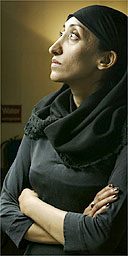Shazia Mirza is a good girl. She doesn't drink alcohol, she doesn't smoke, she doesn't go out with men. She attends the mosque regularly. And not since Quentin Crisp has anyone had the nerve to stand in front of a roomful of drunks and declare their virginity.
"I don't do jokes about sex because I have never had it," she says, in her deadpan nasal Brummie accent. Only if George Clooney converted in the morning and threw himself at her feet would she even consider changing that. It's marriage or nothing. "I'm serious!" she says.
I don't doubt it. Mirza is the unlikely trailblazer for what, until she started appearing in small clubs three years ago in a hijab, was an oxymoron - devout Muslim comedy.
Wednesday, 5 January 2011
Is humour the way to dis-arm fundamentalism?
Was Islamophobia an invention of the extremists?
The invention of Islamophobia
Islamophobia was invented to silence those Muslims who question the Koran and who demand equality of the sexes. By Pascal Bruckner
At the end of the 1970s, Iranian fundamentalists invented the term "Islamophobia" formed in analogy to "xenophobia". The aim of this word was to declare Islam inviolate. Whoever crosses this border is deemed a racist. This term, which is worthy of totalitarian propaganda, is deliberately unspecific about whether it refers to a religion, a belief system or its faithful adherents around the world.
But confession has no more in common with race than it has with secular ideology. Muslims, like Christians, come from the Arab world, Africa, Asia and Europe, just as Marxists, liberals and anarchists come or came from all over. In a democracy, no one is obliged to like religion, and until proved otherwise, they have the right to regard it as retrograde and deceptive. Whether you find it legitimate or absurd that some people regard Islam with suspicion – as they once did Catholicism – and reject its aggressive proselytism and claim to total truth – this has nothing to do with racism.
Do we talk about 'liberalophobia' or 'socialistophobia' if someone speaks out against the distribution of wealth or market domination.
Click on link to read this challenging article at Sight and Sound.com - by Pascal Bruckner
Tuesday, 4 January 2011
Eckhart Tolle Teachings | Eckhart Tolle | Teachings, Quotes, Interviews of Eckhart Tolle
Eckhart's Core Teachings
1. You are not your thoughts. You are the awareness behind the thoughts. Thoughts are often negative and painful, yearning for or fearing something in the future, complaining about something in the present or fearing a matter from the past. However, the thoughts are not you; they are a construct of the ego. Awareness of your thoughts without being caught up in them is the first step to freedom.
2. Only the present moment exists. That is where life is (indeed it is the only place life can truly be found). Becoming aware of the "now" has the added benefit that it will draw your attention away from your (negative) thoughts. Use mindfulness techniques to fully appreciate your surroundings and everything you are experiencing. Look and listen intently. Give full attention to the smallest details.
3. Accept the present moment. It is resistance to the present moment that creates most of the difficulties in your life. However, acceptance does not mean that you cannot take action to rectify the situation you are in. What is important is to drop resistance so that you let the moment be, and that any action arises from deeper awareness rather than from resistance. The vast majority of pain in a person's life comes from resistance to what is.
4. Observe the pain-body. Years of conditioned thought patterns, individually and collectively, have resulted in habitual emotional reactions with an apparent personality of their own. During "pain-body attacks", we become completely identified with this "pain identity" and respond from its agenda -- which is to create more pain for ourselves and others. Observing the pain-body is awareness itself arising, as it allows humans to separate from this unconscious identification with pain.
Click on link for more








